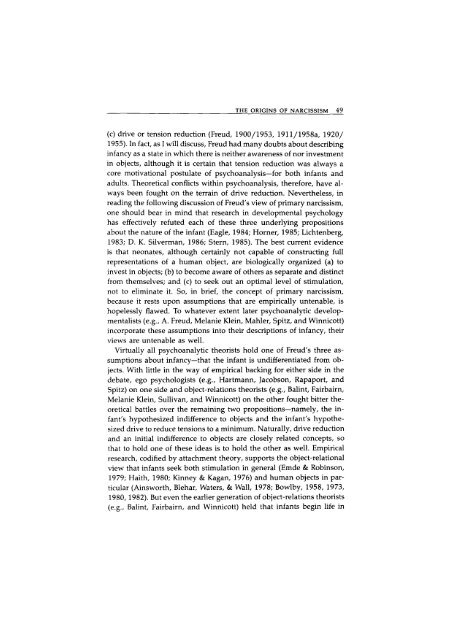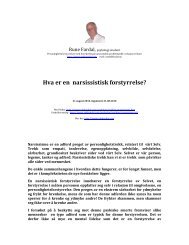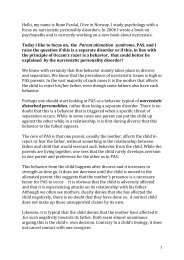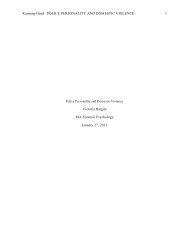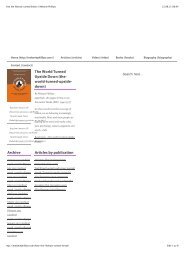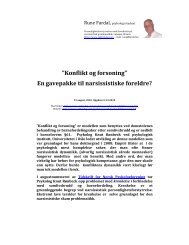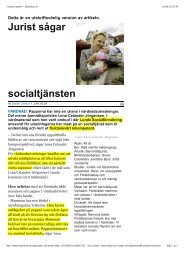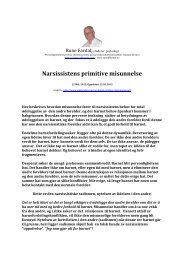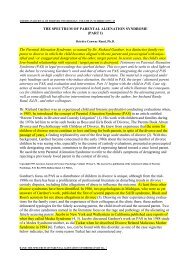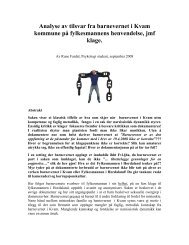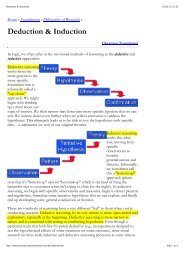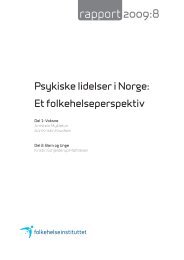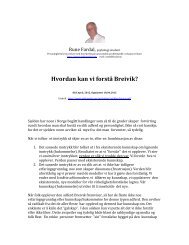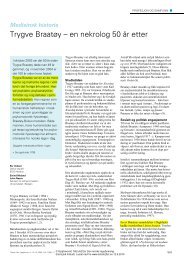The origins of narcissism and narcissistic personality disorder a
The origins of narcissism and narcissistic personality disorder a
The origins of narcissism and narcissistic personality disorder a
Create successful ePaper yourself
Turn your PDF publications into a flip-book with our unique Google optimized e-Paper software.
THE ORIGINS OF NARCISSISM 49<br />
(c) drive or tension reduction (Freud, 1900/1953, 1911/1958a, 1920/<br />
1955). In fact, as I will discuss, Freud had many doubts about describing<br />
infancy as a state in which there is neither awareness <strong>of</strong> nor investment<br />
in objects, although it is certain that tension reduction was always a<br />
core motivational postulate <strong>of</strong> psychoanalysis-for both infants <strong>and</strong><br />
adults. <strong>The</strong>oretical conflicts within psychoanalysis, therefore, have always<br />
been fought on the terrain <strong>of</strong> drive reduction. Nevertheless, in<br />
reading the following discussion <strong>of</strong> Freud’s view <strong>of</strong> primary <strong>narcissism</strong>,<br />
one should bear in mind that research in developmental psychology<br />
has effectively refuted each <strong>of</strong> these three underlying propositions<br />
about the nature <strong>of</strong> the infant (Eagle, 1984; Horner, 1985; Lichtenberg,<br />
1983; D. K. Silverman, 1986; Stern, 1985). <strong>The</strong> best current evidence<br />
is that neonates, although certainly not capable <strong>of</strong> constructing full<br />
representations <strong>of</strong> a human object, are biologically organized (a) to<br />
invest in objects; (b) to become aware <strong>of</strong> others as separate <strong>and</strong> distinct<br />
from themselves; <strong>and</strong> (c) to seek out an optimal level <strong>of</strong> stimulation,<br />
not to eliminate it. So, in brief, the concept <strong>of</strong> primary <strong>narcissism</strong>,<br />
because it rests upon assumptions that are empirically untenable, is<br />
hopelessly flawed. To whatever extent later psychoanalytic developmentalists<br />
(eg, A. Freud, Melanie Klein, Mahler, Spitz, <strong>and</strong> Winnicott)<br />
incorporate these assumptions into their descriptions <strong>of</strong> infancy, their<br />
views are untenable as well.<br />
Virtually all psychoanalytic theorists hold one <strong>of</strong> Freud’s three assumptions<br />
about infancy-that the infant is undifferentiated from objects.<br />
With little in the way <strong>of</strong> empirical backing for either side in the<br />
debate, ego psychologists (e.g., Hartmann, Jacobson, Rapaport, <strong>and</strong><br />
Spitz) on one side <strong>and</strong> object-relations theorists (e.g., Balint, Fairbairn,<br />
Melanie Klein, Sullivan, <strong>and</strong> Winnicott) on the other fought bitter theoretical<br />
battles over the remaining two propositions-namely, the infant’s<br />
hypothesized indifference to objects <strong>and</strong> the infant’s hypothesized<br />
drive to reduce tensions to a minimum. Naturally, drive reduction<br />
<strong>and</strong> an initial indifference to objects are closely related concepts, so<br />
that to hold one <strong>of</strong> these ideas is to hold the other as well. Empirical<br />
research, codified by attachment theory, supports the object-relational<br />
view that infants seek both stimulation in general (Emde & Robinson,<br />
1979; Haith, 1980; Kinney & Kagan, 1976) <strong>and</strong> human objects in particular<br />
(Ainsworth, Blehar, Waters, & Wall, 1978; Bowlby, 1958, 1973,<br />
1980, 1982). But even the earlier generation <strong>of</strong> object-relations theorists<br />
(e.g., Balint, Fairbairn, <strong>and</strong> Winnicott) held that infants begin life in


